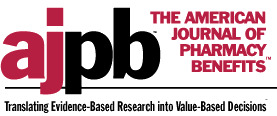This washed up into my email inbox, I know not how or why. But it felt like something that just had to be shared with friends:
Economic Outcomes of Switching Treatment in Major Depressive Disorder Patients
by Maryna Marynchenko, Andrew P. Yu, Veronique Lauzon, Karthik Ramakrishnan, Eric Q. Wu, Rym Ben-Hamadi, Steven I. Blum, Moshe Haim Erder, and Anjana Bose
American Journal of Pharmacy Benefits. 2011 3[6]:e111-e120.
Objectives: To evaluate the economic consequences associated with switching major depressive disorder [MDD] patients from a generic selective serotonin reuptake inhibitor [SSRI] treatment to escitalopram, venlafaxine/duloxetine, or another generic SSRI.
Study Design: Adult MDD patients treated with a generic SSRI, identified in the Ingenix Impact database, were included if they were switched to escitalopram, venlafaxine/duloxetine, or another generic SSRI.
Methods: Urgent care utilization during the 3-month follow-up period and costs incurred during the 3 months before and after the switching date were compared both descriptively and using multivariate regression analyses.
Results: The study identified 7774 patients switched to escitalopram, 10,505 to venlafaxine/duloxetine, and 6723 to another generic SSRI. Compared with escitalopram switchers, venlafaxine/duloxetine switchers had an increased adjusted risk of any-cause, mental health–related, and MDD-related urgent care utilization [odds ratio [OR] = 1.10, 1.30, and 1.36, respectively; all P <.05]. Patients who were switched to a generic SSRI experienced increased adjusted risk of mental health–related urgent care utilization [OR =1.17, P = .0319]. Compared with switchers to another generic SSRI, medical costs were significantly reduced for switchers to escitalopram [–$402] or venlafaxine/duloxetine [–$254; both P <.05]. Escitalopram switchers had relative savings of $383 [P = .016] and $172 [P = .276] compared with venlafaxine/duloxetine switchers and generic SSRI switchers, respectively.
Conclusions: Switching from generic SSRI therapy to escitalopram appears to be a more effective strategy in MDD than switching to venlafaxine/duloxetine and at least as cost-effective as switching to another generic SSRI therapy.
Healthcare Costs Associated With Escitalopram and Alternative SSRIs
by Dominick Esposito, Peter Wahl, Gregory W. Daniel, Michael A. Stoto, and Thomas W. Croghan
American Journal of Pharmacy Benefits. 2011 3[5]:e93-e101.
Objective: To compare healthcare costs associated with initiating treatment on escitalopram or an alternative selective serotonin reuptake inhibitor.
Study Design: Retrospective cohort study using administrative claims data.
Methods: Patients were included if they had a depression-related diagnosis and 6 months or longer of health plan eligibility before and after the date of their first claim for a study antidepressant. Dependent variables included total healthcare costs and component pharmacy, medical, inpatient, and mental health treatment costs in the 6 months after initiation of antidepressant therapy. Propensity score analysis was used to account for selection bias in antidepressant choice [escitalopram vs other antidepressants]. Incorporating this adjustment, regression analysis was used to examine the association between antidepressant choice and subsequent healthcare costs.
Results: Escitalopram initiators had lower total healthcare costs [$2327 vs $2383, P <.05], lower medical costs [$1666 vs $1807, P <.01], higher inpatient costs [$555 vs $541, P <.01], and higher total pharmacy costs [$587 vs $503, P <.01] in the 6 months after initiation compared with patients initiating with other antidepressants. There was a statistically significant difference in lower total healthcare costs for escitalopram initiators. Escitalopram was also associated with higher mental healthcare costs [$377 vs $304, P <.01].
Conclusions: Total healthcare costs were only slightly lower for patients initiating treatment with escitalopram. These reductions are unlikely to reflect improved clinical outcomes associated with escitalopram. Their impact on health plan budgets is unknown.
Don’t you just love, "Translating Evidence-Based Research into Value-Based Decisions." It sounds like it ought to be set to music – maybe rap. But that’s not all. The email is a treasure trove of resources:
I found CMAC 2011 particularly interesting:
Industry’s Senior Commercial Executives Convene this December in Philadelphia!Join executives responsible for ensuring the commercial success of new drugs, devices and diagnostics at CBI’s 2nd Annual Commercialization and Market Access Congress. With increased generic competition, growing pressure to align product price with value and a trend toward reductions in marketing and sales forces, companies must consider factors that make a product commercially viable at every step of development and launch. How is the U.S. marketplace impacted by healthcare reform and how can companies position themselves for success in a shifting market? What information do payers need to make a positive reimbursement decision? How should internal product teams interact with clinical development and external thought leaders to pave the way for an effective launch? These and many other questions are addressed in this interactive forum. Building off our successful premier event, CMAC 2011 will be co-located with the 7th Annual Biopharmaceutical Trade & Channel Strategies, increasing your networking and benchmarking opportunities!
So in this one unsolicited email, I got detailed evidence-based information from the Managed Care industry about how to shave costs and pick generic medications based on overall cost analyses AND just missed an opportunity to fly to Philadelphia to find out how to optimize profits launching new drugs, and how to get Managed Care companies to accept them. I particularly liked, "How should internal product teams interact with clinical development and external thought leaders to pave the way for an effective launch?" In case you’ve been in a coma in Sleepy Hollow for 25 years, an external thought leader is a physician/psychiatrist disguised as an expert who is on a drug company’s speaker’s bureau, or does industry-funded Continuing Medical Education, or signs on to an industry-written journal article.





So, the escattawhatever initiators saved $56 over 6 months on total health care costs and that was “significant” at .05 – okay. But within “total health care”, mental health care was “significantly” higher (up $73). So, is what they’re selling maybe a cure for the common cold? Or gastrointestinal distress? It wouldn’t appear that it is helping people for the presenting complaint.
An email I just received for this new text book. With APA sponsorship, I am already skeptical of the data. http://paracom.paramountcommunication.com/hostedemail/email.htm?CID=10571587147&ch=02095F4312E055D5E76F69264367552F&h=fbfecc3c1dda768f0f9806e45a9ea526&ei=WcOzsUTNN David Bransford MD